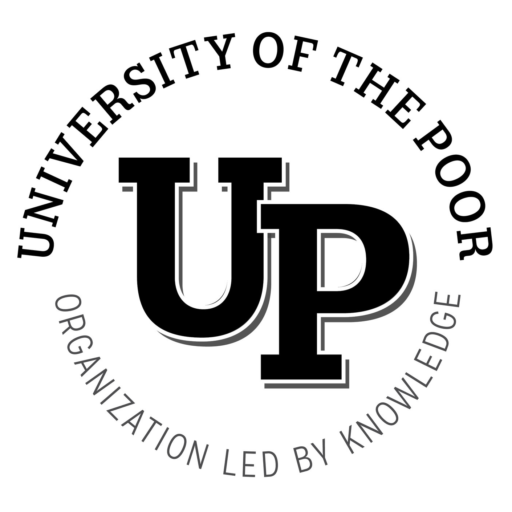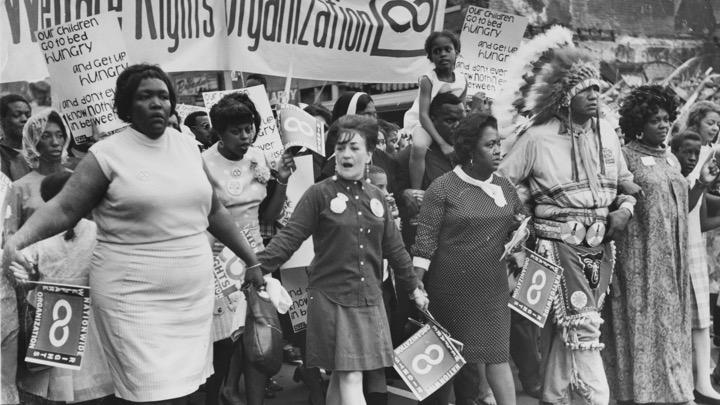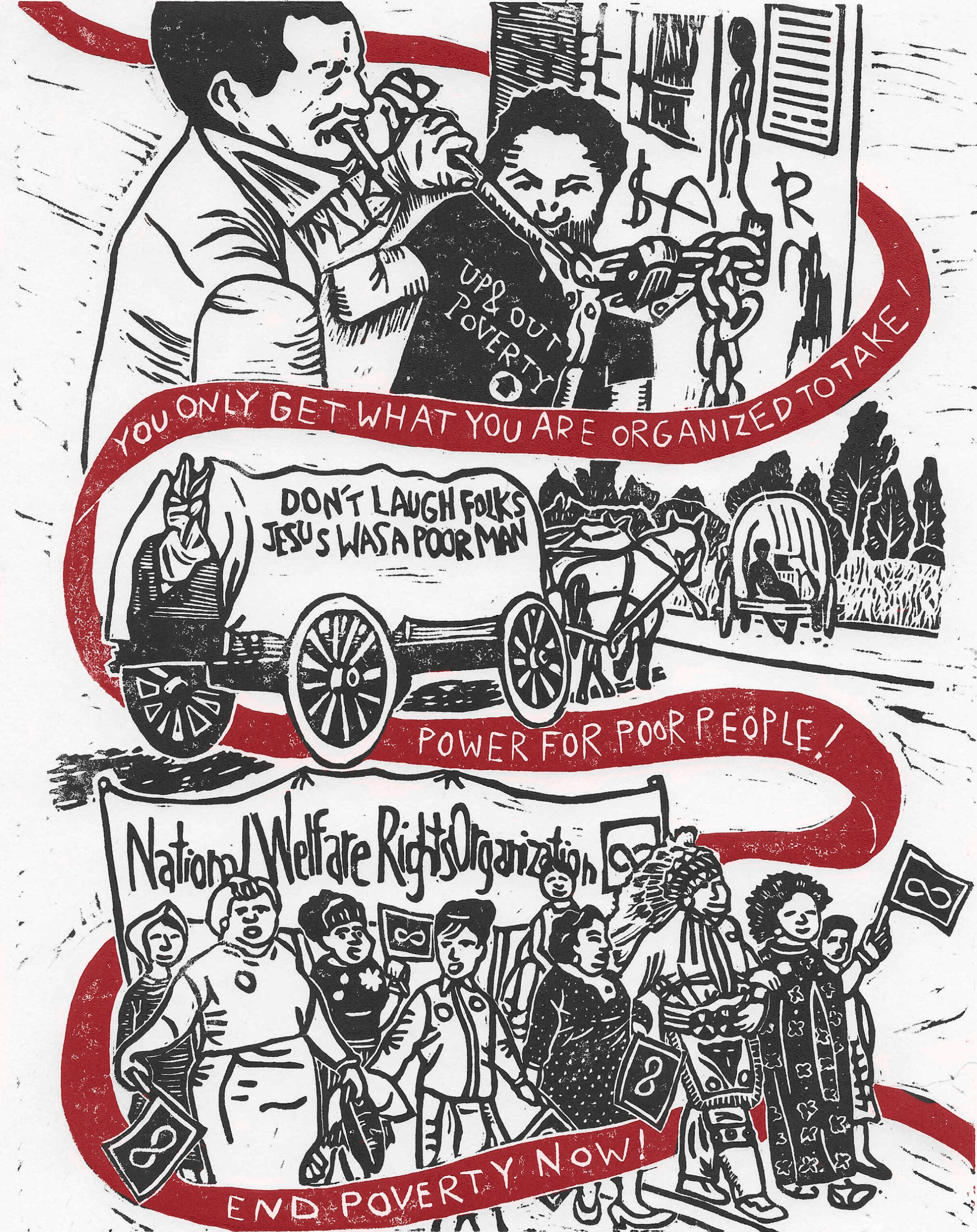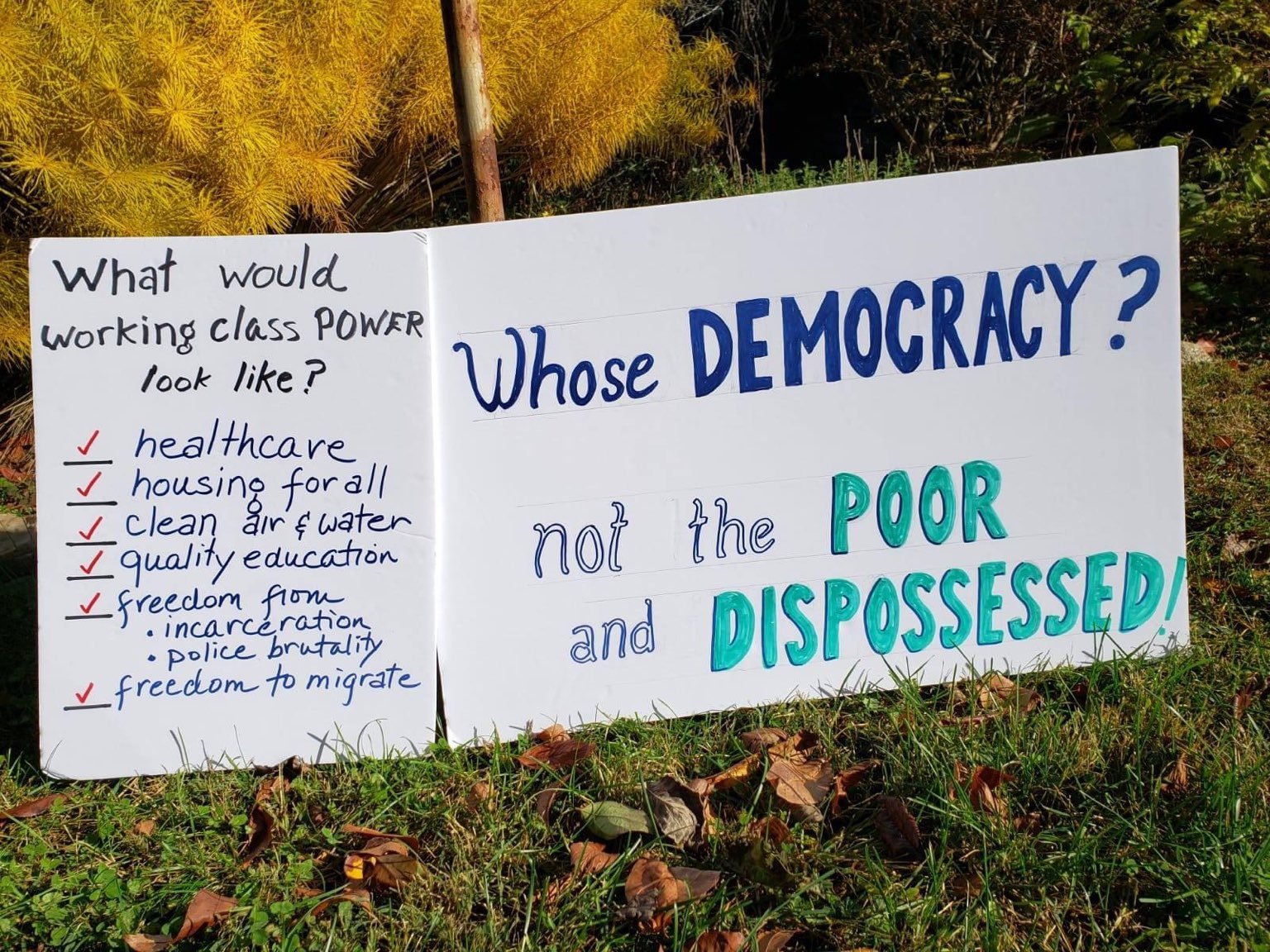by Lenny Brody
Everywhere you look these days, serious divisions, disruptions, and polarizations are erupting across society. How we analyze these ruptures and schisms has a critical impact on how we organize in our fight for the basic necessities of life. As revolutionary political organizers, it is necessary that we don’t lose the forest for the trees; that we always take into account the “big picture.” To effectively organize and build power, we must develop a deep understanding of the conditions we are facing.
The University of the Poor Concept Paper, the basic political document of the University of the Poor, points out how societies develop and change; the economic foundation of society shapes and conditions events throughout the entire society. Politics and political crises, then, are a concentrated expression of this economic foundation. The amazing technological innovations of the present moment are transforming the way things are produced and the way we work. The stable jobs of the past “industrial” period are gone forever and are being replaced by low-wage jobs and by mass unemployment and growing homelessness.
As a result of these epochal economic transformations, it is becoming increasingly clear that the dominant polarization in life today is the fantastic growth of wealth for the few and growing poverty for the many. This is the economic crisis of global capitalism that underlies the divisions, disruptions and polarizations going on today across this country and the world at large.
Eras of polarization
In different periods of history, there are different polarizations that characterize the class struggles of that time. In recent history, these polarizations have morphed and changed rather quickly, by historical standards, as the modes of capitalist production have rapidly transformed. In the United States, during the 1930s, the growth of large scale industrial production led to class struggles to organize unions and workers in large factories. Workers fought the corporations and banks that owned these factories and this motion of labor became the center of gravity of the class struggle at that time.
In the post World War II period, the economically advanced countries spread capitalist production and intensified colonial oppression across the world. A section of the workers in the advanced countries benefited from the wealth generated. This led to the class struggle being concentrated in the colonial world and expressed in the national liberation struggles against imperialism.
Today, conditions have changed again. Capitalism is truly global (not just “international”) and the capitalist class is global, led by U.S. capital. Similarly, the working class is increasingly developing as a global class of the poor and dispossessed. The new methods of production are leading to a massive surplus population at the global level. While members of the working class on occasion work for capitalists, this class is beginning to find itself peripheral to the capitalist system of production as a whole. They, increasingly, no longer have an ongoing relation to production. They move in and out of employment and are being pushed towards the illegal or semi-legal underground economy and permanent unemployment. More than 60% of the global workforce is considered “precarious” or in non-standard employment.
The organization of the poor today
What are the conditions we face today in the U.S.? New conditions lead to new forms of struggle and new organizations of our class, so this is a question we must prioritize answering. Over the last 50-plus years, with the replacement of large scale industrial production in which factories employed tens of thousands of workers, the importance of the workplace in the class struggle has been increasingly reduced. Today, the leading struggles of the poor and dispossessed are not just about the fight against employers, but are coming up against the government and the entire state apparatus (police, government agencies, courts, etc.).
These struggles are potentially explosive, but largely nascent, in part because the poor today have few organizations and are the least organized section of society. Indeed, the desperate call to build substantial and lasting organizations of the poor is a most critical task today. Technological developments have produced an intensifying and permanent economic crisis with widespread and growing poverty. Before the COVID-19 pandemic, there were 140 million poor and low-wage workers in the U.S. These numbers have likely only increased and will continue to do so. Our class is facing a desperate need for political power to transform the conditions we suffer under. At every turn, we face the influence and control of the powers that be.
On what can appear to be “our side,” there are thousands of nonprofits funded by the major corporations and banks that limit and misdirect our struggles. There are also many organizations and nonprofits that, not understanding the strategy and tactics of our enemies, end up unconsciously supporting the goals of our enemies. Often when “liberals” and “conservatives” fight around issues, these various organizations end up supporting seemingly “progressive leaders.” But these organizations end up taking positions that in reality represent the dominant section of the ruling class, without understanding if it is appropriate or not to make the “compromise.” For example, supporting any Democrat against Republican politicians will often strengthen our enemies within the Democratic Party.
The electoral terrain
The fight for political power and political independence is objectively beginning within the electoral arena, but must not be limited to that arena. In fact, the strength of any activity of the poor and dispossessed in the electoral arena depends on its organized relations to the life-and-death struggles of the poor and dispossessed. The influence of an elected official is directly related to that individual’s organized base of strength in the community. Maneuvering within the electoral arena in isolation of the actual class struggle has historically proven a serious failure, with “victories” granted and then coldy taken away by the whims of the politically powerful. This is the cost of an electoral strategy disconnected from the broad and independent motions of the poor, and the inevitable consequence of an era defined by its lack of independent organizations of the poor.
This has been true across American history. For example, during the 1930s and 1940s, a historical period hotly referenced today, the varied organizations of the poor and workers, unable to build their own political party and electoral representation at a national scale, instead relied on a compromised relationship with the Roosevelt administration in which they were always the “junior partner.” In turn, Roosevelt and his New Deal Coalition relied in part on the mass base of America’s immiserated industrial workers to hold power and rebuild a failing economy.
The New Deal Coalition was still dominated and led by the interests of the capitalist class in general, and Wall Street in particular. By the end of WWII, this allowed for the rightward shift of the Democratic Party and the purge of radicals from the unions. It also necessitated the need to restart the struggle against Jim Crow segregation due to the Coalition’s compromises with the southern racist Democrats. As a result, the lack of political independence of the working class organizations led to the strengthening of our enemies.
Center-left coalitions and “united front” tactics, where revolutionaries follow behind centrist elements, have time and time again led to the defeat of our class. While compromise is necessary under certain conditions, and we must work with people who we have differences with, this can only be accomplished in a principled and strategically constructive way from a position of strength vis-à-vis the political independence of the poor. It bears repeating: our political power within the electoral arena is dependent on and based in the strength and independence of the organizations and wider struggles of the poor and dispossessed.
Unity of the poor or identity politics of the rich?
With this in mind, we should return to the question of the specific conditions we face today. Over the past decade, the Republican Party has become a right-wing populist party representing a minority position in the ruling class. Now, the dominant section of the ruling class, the major banks and corporations, is instead using the Democratic Party to beat back the Republicans. In order to do this, the Democrats are, to a limited degree, attempting to speak to the needs and demands of the poor. In fact, the major corporations and banks are waging a widespread campaign against the Republicans by using and manipulating our struggles. We see this, for instance, in the millions of dollars they are donating to the fight for climate justice, health care and Black Lives Matter. The goal of this ruling class campaign is not to liberate the poor, but to beat back the right-wing populist upsurge and stabilize our highly tumultuous economic situation.
But the economic crisis that we face today is systemic and chronic. In a time of endemic poverty and high rates of inequality that are baked into the system, there can only be partial economic recoveries and, in the mid-to-long term, the ruling class cannot stabilize the country. With this in mind, the poor and dispossessed need to develop our own campaign that is fully conscious of what the “ruling class campaign” is attempting to accomplish. Moreover, we must become aware that as the ruling class attempts to partially address our demands by involving us in their campaign, it simultaneously and consistently pushes “identity politics” to prevent the actual unity of those of us on the bottom. Our class enemy has always oppressed various groups to different degrees. They have used this to keep us divided and fighting each other for the crumbs they dole out. Identity politics unifies the rich and the poor within discrete identities and blocks the unity of the poor at every opportunity. Our class power flows from the unity of those at the bottom.
It is the case, then, that one of the major ideological battles in the U.S. today is the “unity of the poor” vs. “identity politics.” As poverty, hunger, rampant sickness and more continue to expand, this is a battle we cannot sit out. The ideological weapon of identity politics employed by the rich demands that the poor and dispossessed advance its interests through its own campaigns, independent of the ruling class. The need for these campaigns is an expression of the class struggle. And the class struggle is a political struggle, a fight for political power.
Lenny Brody has been politically active since the early 1960s. During the mid-1960s he was a volunteer with the Southern Christian Leadership Conference, the civil rights organization led by Dr. Martin Luther King, Jr. in South Carolina. As part of his activities in protest of the Vietnam War he refused induction into the Army. He was a founding member of the Communist Labor Party and has studied economics and theories of political change while continuing his political activism. Currently he is one of the coordinators of the University of the Poor Think Tank and a member of the University of the Poor Journal.



